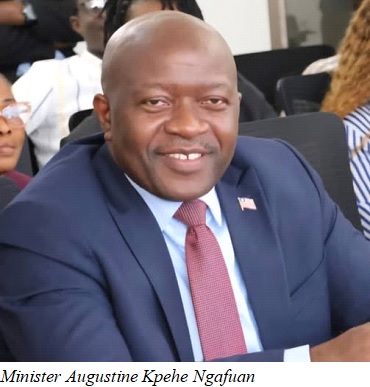MONROVIA – The International Monetary Fund (IMF) has approved a significant disbursement of US$26.5 million to Liberia, marking a major milestone in the country’s economic development journey. The approval follows the successful completion of the Article IV Consultation and second review of Liberia’s Extended Credit Facility (ECF) arrangement, underscoring the country’s progress in implementing sound macroeconomic policies and key structural reforms. And there broad smiles amongst the country’s fiscal mangers, as The Analyst reports.
IMF’s Executive Board has approved of US$26.5 million following completion of Article IV consultation and successful second review of Liberia’s ECF Arrangement, Finance and Develop Planning Ministry revealed in a release.
According to the release, the Executive Board of the International Monetary Fund (IMF) on Wednesday, October 1, 2025, approved the immediate disbursement of US$26.5 million or about 19.3 million in Special Drawing Rights (SDR) to Liberia.
The IMF’s Board decision followed the completion of the Article IV Consultation and second review of the Extended Credit Facility (ECF) arrangement for Liberia.
The ECF arrangement is a 40-month program approved by the IMF Board on September 25, 2024. Disbursements under the ECF program go mainly to bolster the Central Bank of Liberia’s reserves to help maintain overall macroeconomic stability.
The latest disbursement brings total disbursements thus far under the ECF arrangement to US$79.4 million or SDR 57.9 million.
Following the Executive Board discussion, Mr. Bo Li, Acting Chair and Deputy Managing Director, made the following statement: “The authorities have made notable progress in implementing sound macroeconomic policies and key structural reforms in the first year of their Fund-supported program.
“Measures to reduce the large fiscal deficit, mitigate debt vulnerabilities, and strengthen foreign exchange reserves have yielded encouraging results. Swift policy responses to the sudden termination of large grant support—through rationalizing low-priority spending and mobilizing additional domestic revenues—have also safeguarded critical social programs previously financed by USAID.”
IMF Executive Directors also commended the government for maintaining a prudent fiscal stance, particularly in light of reduced foreign aid.
They were encouraged by the forward-looking fiscal strategy aimed at further increasing tax revenues to meet social and development needs, rebuilding fiscal space, and mitigating debt vulnerabilities.
Directors also stressed the importance of ongoing fiscal reforms, notably through improving the quality of public spending and strengthening public financial and investment management.
They underlined the importance of mobilizing revenues and catalyzing donor support—especially through grants and concessional financing—to address the large infrastructure gap while safeguarding debt sustainability.
More generally, Directors urged the need to maintain a robust debt management policy to prevent the accumulation of new external arrears.
Reacting to the positive news from the IMF, Liberia’s Finance and Development Planning Minister Augustine Kpehe Ngafuan commended the IMF Board for the decision, which he considers a vote of confidence in the sound management of the economy, especially during this challenging period of declining Overseas Development Assistance (ODA).
He noted that Wednesday’s successful review by the IMF Board of Liberia’s performance under the ECF arrangement puts Liberia firmly on track to possibly benefit from significant additional support in 2026 under the IMF’s Resilience Sustainability Facility (RSF), which provides funding to qualifying countries to improve their resilience and adaptation to climate-related vulnerabilities.
Minister Ngafuan also lauded Central Bank Governor Henry F. Saamoi and his team at the Central Bank of Liberia (CBL) for the excellent cooperation and coordination with the fiscal authorities under the overall guidance of President Joseph Nyuma Boakai.
He reiterated the government’s commitment to remaining on track and taking the necessary measures to expand the economy and mobilize the required resources to support the achievement of the ambitious targets set under the ARREST Agenda for Inclusive Development (AAID).
Under the ECF arrangement, a total of approximately US$223 million or SDR 155 million (60 percent of quota) was approved by the IMF Executive Board on September 25, 2024, to be disbursed in tranches to Liberia over the 40-month duration of the program after successful regular reviews of performance under the program.
The Analyst has learned the fiscal and monetary team of the government burst into ululation following the signing, as the government was being challenged with the horde of economic shocks occasioned by, amongst other things, the pull back of USAID and other factors.
“Sincere thanks to President JNB, Ministry of Finance and Development Planning Minister Augustine Kpehe Ngafuan II, Liberia’s Governor to the IMF and World Bank and his team, Governor Samoi and the Central Bank of Liberia, and the entire government for their tireless efforts,” an official of the ruling Unity Party was heard on a local radio Thursday.

Comments are closed.